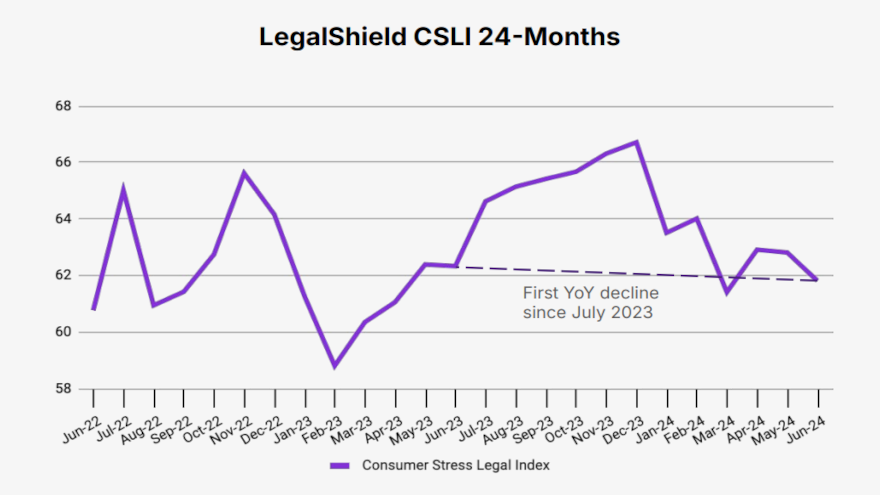LegalShield’s Consumer Stress Legal Index dips in June

Chart courtesy of LegalShield.
By subscribing, you agree to receive communications from Auto Remarketing and our partners in accordance with our Privacy Policy. We may share your information with select partners and sponsors who may contact you about their products and services. You may unsubscribe at any time.
While also extrapolating its data to make a presidential election prediction, LegalShield offered an update on its Consumer Stress Legal Index (CSLI), which dipped a bit in June.
Based solely on consumer inquiries seeking legal assistance in June, LegalShield reported its latest data showed the CSLI dropped 1.0 point from May to 61.8, representing the first year-over-year decline since last July.
Analysts pointed out the CSLI also has been around the same level since March.
LegalShield recapped in its latest report that inflation improved 0.1% in June to a 12-month rate at 3%, near a three-year low. Analysts added the June jobs report beat expectations with 206,000 new jobs, but unemployment unexpectedly ticked up to 4.1%, the highest level since October 2021.
“With reduced inflation, there is greater anticipation of an interest rate cut in September. However, stress remains steady,” LegalShield said in the report.
Analysts delved deeper into their latest data, beginning with the bankruptcy subindex that reflects the number of intakes related to bankruptcy as a share of total intakes across all areas of law.
Subscribe to Auto Remarketing to stay informed and stay ahead.
By subscribing, you agree to receive communications from Auto Remarketing and our partners in accordance with our Privacy Policy. We may share your information with select partners and sponsors who may contact you about their products and services. You may unsubscribe at any time.
LegalShield said the bankruptcy subindex declined 1.7 points in June to 29.5, marking an 18.6% increase year-over-year.
Analysts explained the bankruptcy subindex historically leads the total number of bankruptcy filings as reported by the U.S. court system by two quarters, with a .98 correlation.
“Despite consecutive months of decline, the bankruptcy subindex is on a steady rise since Q4 of 2021 after a sharp drop-off as pandemic relief funds hit in 2020. The bankruptcy subindex continues its steady climb, potentially back to pre-pandemic levels,” LegalShield said in the report.
Furthermore, LegalShield touched on its consumer finance subindex, which reflects the number of intakes related to consumer finance issues such as billing disputes, vehicle repossessions and payday loans, as a share of total intakes across all areas of law.
Analysts determined the consumer finance subindex ticked 0.4 points lower in June to 101.7, representing a 6.6% decline year-over-year.
“The consumer finance index remained relatively flat in June, holding a seasonally consistent rise in Q2. Continued elevated interest rates could contribute to a future increase,” LegalShield said in the report.
Political view of newest data
LegalShield also spent some time viewing its data through the political prism for this election cycle.
LegalShield is reporting consumer stress levels on a politically geographic basis, separating red, blue, and purple battleground states. LegalShield classified states based on the outcome of the 2020 election. Battleground states for 2024 are Arizona, Georgia, Michigan, Nevada, North Carolina, Pennsylvania and Wisconsin.
LegalShield’s CSLI in battleground states dropped 7% in June to its lowest level this election cycle, deepening an indication held by analysts that Democrats could hold the White House in November.
The latest LegalShield data is based solely on consumer inquiries seeking legal assistance in June, prior to President Joe Biden exiting the election.
“We track 150,000 calls for legal help each month, prompted by everyday Americans facing an issue in their lives,” LegalShield senior vice president of consumer analytics Matt Layton said in a news release. “We aren’t pollsters. Our data reveals exactly what people are dealing with in their lives, and that data has a high correlation to how people vote.”
LegalShield members seek legal help about 5,000 times a day. The topics of those calls have been anonymously tracked for more than 22 years to feed LegalShield’s CSLI.
In June, analysts found that battleground consumer stress dropped to five points below the national average, its largest deviation this election cycle and the fourth month in a row below the national index.
In the last five presidential election years, LegalShield said a Democrat secured or maintained the White House when consumer stress in battleground states remained lower than the national average in October and November.
“This election is historic in many ways, as was an election amidst a global pandemic,” Layton said.
“Our data is blind to macro influences and carries no political bias. It has held as a steady gauge of voter actions dating back five elections regardless of party,” he continued. “We’ve also seen our data trends shift in the months leading into the election, so we’re watching for any potential movement.”


